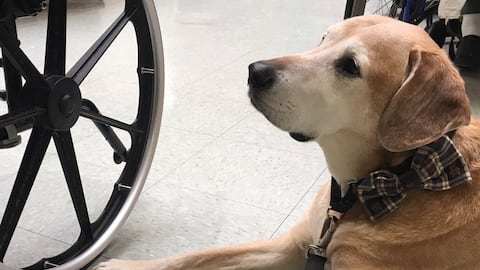UK charity trains dogs to detect early stage bowel cancer
What's the story
The UK-based Medical Detection Dogs Charity has started a groundbreaking 2025 study, training dogs to sniff out early-stage pancreatic cancer. Six dogs, including Labradors Luna, Hugo, Daisy, and German Shepherd Rex, are being trained to detect cancer markers in breath and urine samples. The initiative targets one of the deadliest cancers, aiming for faster, non-invasive diagnosis. The research could save lives by catching pancreatic cancer in its earliest, most treatable stages.
Potential impact
Dogs aim to provide quicker, more sensitive cancer detection
Pancreatic cancer is difficult to detect early, often leading to late diagnoses. "Dogs' extraordinary sense of smell allows them to detect biomarkers missed by current diagnostic tools," said Claire Guest, charity founder. The dogs' detection methods are being tested in double-blind trials. If successful, this could complement traditional diagnostic methods, significantly improving survival rates. This innovative approach could transform cancer detection and deliver a faster, less invasive diagnostic solution.
Training process
How the dogs learn to detect cancer
The charity uses scent training to teach dogs to identify pancreatic cancer markers in patient samples. Samples from London's St George's Hospital are placed on interactive rigs, with every sniff recorded. Dogs signal detection by standing still or paw-tapping. Rewarded with treats and affection, the dogs are trained to detect even the faintest cancer markers. This precise, systematic process ensures that the dogs' skills are reliable for medical use, offering hope for early diagnoses.
Broader applications
Dogs trained for other cancers
Medical Detection Dogs is already known for identifying diseases like prostate cancer and Parkinson's. This pancreatic cancer project builds on 15 years of research into disease-detecting odours. Dogs' ability to identify cancer markers could expand to other hard-to-detect cancers, such as ovarian and stomach cancer. By using dogs ethically sourced from breeders or rescues, the charity ensures a steady supply of highly trained dogs ready to revolutionise early cancer detection.
Why it matters
Saving lives through early diagnosis
Pancreatic cancer is often diagnosed too late for effective treatment, making early detection critical. "Dogs have the potential to detect cancer earlier than any human-designed technology," said Gemma Butlin, Head of Communications. The charity's work could change the way cancers are diagnosed, offering a non-invasive, fast, and accurate solution. With further trials, canine detection might soon complement traditional diagnostic tools, saving thousands of lives worldwide.
